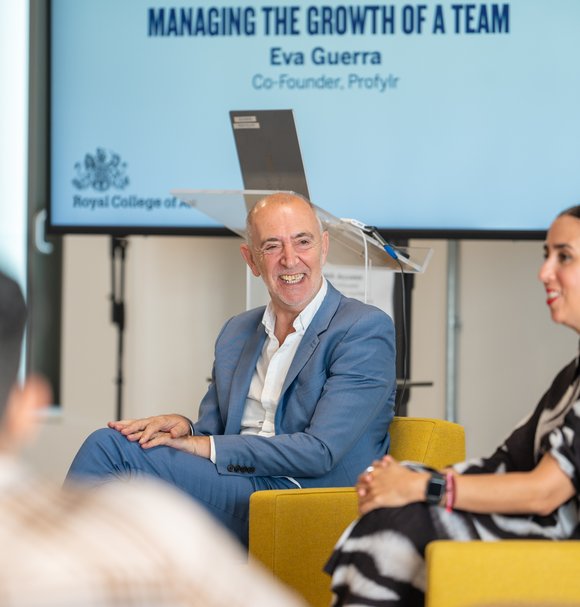
Key details
Date
- 14 November 2024
Read time
- 2 minutes
The Royal College of Art (RCA) has launched a new round of Innovate UK Accelerated Knowledge Transfer (AKT) projects focused on circular fashion.
Key details
Date
- 14 November 2024
Read time
- 2 minutes
Following the delivery of four projects in the first round of funding earlier this year - a significant success for the RCA - two projects are being delivered in a new round of funding. Accelerated Knowledge Transfer projects are four-month collaborative projects between academic institutions and businesses, facilitated by Innovate UK.
They involve an Academic Lead and a Business Partner working together to deliver a short, rapid and targeted intervention designed to accelerate the evaluation or development of an innovation project or concept, with the potential for a significant impact for the Business Partner.
The two projects in this current round see the RCA working with two dynamic companies that have both come through InnovationRCA - the Royal College of Art’s centre for entrepreneurship and commercialisation, providing incubation, IP and business support:

Petit Pli is an innovative, internationally-acclaimed brand known for its adaptable children’s clothing that grows with the child. To shift the UK children's apparel market towards a circular economy, Petit Pli, and the Royal College of Art, will develop an innovative knitted system, using Petit Pli's Knot-Tile® Technology, that adapts garment size as children grow. This project will leverage advanced knitting and sustainable fibres to create a portfolio of durable, environmentally friendly clothing.

GENERA LABS is an innovative and award-winning software startup, reinventing the digital clothing design workflow with accessible and easy-to-use tools. GENERA STUDIO, their flagship service is a cloud-based engine for digital fashion designers, game developers and CGI studios, to build and export optimised digital clothing in seconds. In partnership with the Computer Science Research Centre at the Royal College of Art, GENERA LABS will develop a next-generation service prototype addressing the need for more accessible and easy-to-use digital clothing design software specific to the fashion industry. The project aims to demonstrate how democratising technology can accelerate the adoption of computer-aided design in the fashion and textile sector, and drive positive impact by digitising certain design and sampling processes.
The earlier round of four now-completed projects are:
- Circular Fashion Jewellery: Assessing & Developing Beyond Point of Sale Value Chains, with Monsoon Brands Ltd
Assessing scalable system innovation to enable Monsoon Brands to develop a value chain beyond the point of sale for circular fashion jewellery. The project explored opportunities for circularity and end-of-life routes, identified collaborative partners and developed a framework for a jewellery take back scheme.
- Complicity: Integrating Live Performance and Mobile Technology, with the Young Vic
The project involved working with the Young Vic to develop a software platform for integrating audiences into experimental theatre productions via mobile technology; building a system leveraging emerging social uses of technology to make audiences both active and complicit participants within complex theatrical narratives.
- Towards Embedding Inclusive Design in Financial Services Innovation
This was an accelerated knowledge transfer project between the Helen Hamlyn Centre for Design at the RCA and the Inclusive Design, Experience Innovation and Design Assurance teams at Lloyds Banking Group (LBG). Using the participatory methods of inclusive design, we worked directly with key Lloyds design and innovation stakeholders, in order to understand their current approaches to inclusive design, and identify opportunities to further incorporate and scale inclusive considerations across the design of financial products and services.
- Building community around a memorial service that restores marine ecosystems, with Resting Reef
Engaging coastal communities in conversations about death, legacy and the environment; using participatory design to explore perceptions and potential impacts of a community reef in Cornwall; the project with Resting Reef emphasised local knowledge sharing and eco-social equity, with the potential to scale across diverse regions.
